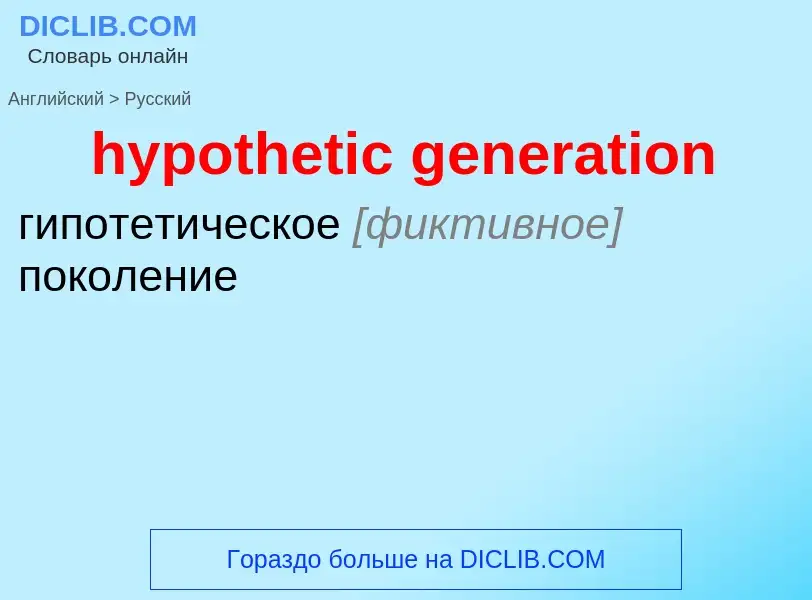Μετάφραση και ανάλυση λέξεων από την τεχνητή νοημοσύνη ChatGPT
Σε αυτήν τη σελίδα μπορείτε να λάβετε μια λεπτομερή ανάλυση μιας λέξης ή μιας φράσης, η οποία δημιουργήθηκε χρησιμοποιώντας το ChatGPT, την καλύτερη τεχνολογία τεχνητής νοημοσύνης μέχρι σήμερα:
- πώς χρησιμοποιείται η λέξη
- συχνότητα χρήσης
- χρησιμοποιείται πιο συχνά στον προφορικό ή γραπτό λόγο
- επιλογές μετάφρασης λέξεων
- παραδείγματα χρήσης (πολλές φράσεις με μετάφραση)
- ετυμολογία
hypothetic generation - translation to ρωσικά
общая лексика
Fourth Generation Language
язык 4-го поколения, язык уровня 4GL
базирующиеся на словарях языки программирования, позволяющие увеличить производительность разработки систем, когда программы пишутся так, что состоят из команд прикладного пакета (обычно написанного на языках 2GL и/или 3GL). Например, программы на языках СУБД (FoxBase, Paradox и др.). К 4GL относятся языки запросов (SQL) и отчетов
Ορισμός
Βικιπαίδεια
Generation Z (or more commonly Gen Z for short), colloquially known as zoomers, is the demographic cohort succeeding Millennials and preceding Generation Alpha. Researchers and popular media use the mid-to-late 1990s as starting birth years and the early 2010s as ending birth years. Most members of Generation Z are children of Generation X.
As the first social generation to have grown up with access to the Internet and portable digital technology from a young age, members of Generation Z, even if not necessarily digitally literate, have been dubbed "digital natives". Moreover, the negative effects of screen time are most pronounced in adolescents compared to younger children. Compared to previous generations, members of Generation Z tend to live more slowly than their predecessors when they were their age; have lower rates of teenage pregnancies; and consume alcohol (but not necessarily other psychoactive drugs) less often. Generation Z teenagers are more concerned than older generations with academic performance and job prospects, and are better at delaying gratification than their counterparts from the 1960s despite concerns to the contrary. Sexting among adolescents has grown in prevalence; the consequences of this remain poorly understood. Additionally, Gen Z subcultures have been quieter though they have not necessarily disappeared.
Globally, there is evidence that the average age of pubertal onset among girls has decreased considerably compared to the 20th century with implications for their welfare and their future. Additionally, the prevalence of allergies among adolescents and young adults in Generation Z is greater than the general population; there is greater awareness and diagnosis of mental health conditions, and sleep deprivation is more frequently reported. In many countries, Gen Z youth are more likely to be diagnosed with intellectual disabilities and psychiatric disorders than older generations.
Around the world, members of Generation Z are spending more time on electronic devices and less time reading books than before, with implications for their attention spans, vocabulary, academic performance, and future economic contributions. In Asia, educators in the 2000s and 2010s typically sought out and nourished top students; in Western Europe and the United States, the emphasis was on poor performers. Furthermore, East Asian and Singaporean students consistently earned the top spots in international standardized tests in the 2010s.
As consumers, their aggregate purchasing behavior deviates from the ideals and values commonly associated with them in opinion polls.




 (2).jpg?width=200)

![Palais des Beaux-Arts]] in Lille, France (2016) Palais des Beaux-Arts]] in Lille, France (2016)](https://commons.wikimedia.org/wiki/Special:FilePath/Selfie au Palais des Beaux-Arts.jpg?width=200)
![Series 5]]). Popular franchises such as ''Doctor Who'' have inspired numerous fan fiction stories written mostly by young female authors. Series 5]]). Popular franchises such as ''Doctor Who'' have inspired numerous fan fiction stories written mostly by young female authors.](https://commons.wikimedia.org/wiki/Special:FilePath/The Eleventh Doctor and Amy Pond.jpg?width=200)


.jpg?width=200)










![Youths protest in Toronto as part of the [[School strike for climate]] movement, 2019. Youths protest in Toronto as part of the [[School strike for climate]] movement, 2019.](https://commons.wikimedia.org/wiki/Special:FilePath/Portait Alienor Rougeot-Fridays for future March 15-2019; Photographer Dina Dong (cropped).jpg?width=200)
![protesting against the COVID lockdown]], 2022. protesting against the COVID lockdown]], 2022.](https://commons.wikimedia.org/wiki/Special:FilePath/HKU student white paper protest 20221129.jpg?width=200)
![Iranian morality police]] for allegedly violating the hijab code, 2022. Iranian morality police]] for allegedly violating the hijab code, 2022.](https://commons.wikimedia.org/wiki/Special:FilePath/Amir Kabir University uprising September 2022 (4).jpg?width=200)
